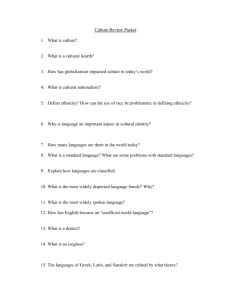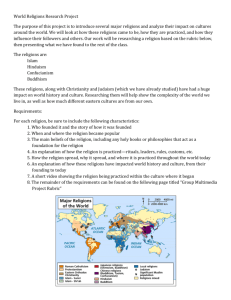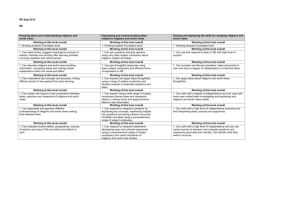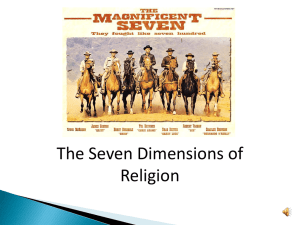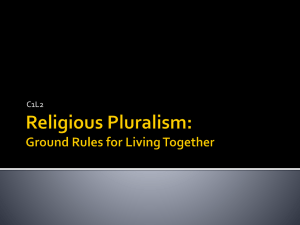introduction - Highlands Presbyterian Church
advertisement
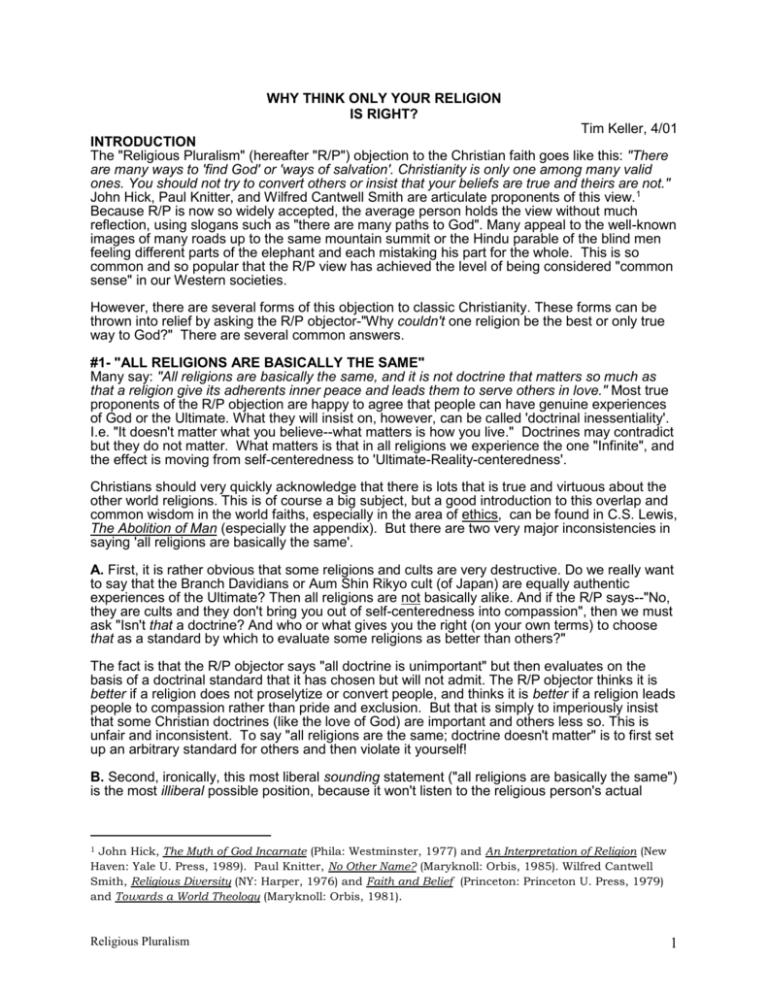
WHY THINK ONLY YOUR RELIGION IS RIGHT? Tim Keller, 4/01 INTRODUCTION The "Religious Pluralism" (hereafter "R/P") objection to the Christian faith goes like this: "There are many ways to 'find God' or 'ways of salvation'. Christianity is only one among many valid ones. You should not try to convert others or insist that your beliefs are true and theirs are not." John Hick, Paul Knitter, and Wilfred Cantwell Smith are articulate proponents of this view. 1 Because R/P is now so widely accepted, the average person holds the view without much reflection, using slogans such as "there are many paths to God". Many appeal to the well-known images of many roads up to the same mountain summit or the Hindu parable of the blind men feeling different parts of the elephant and each mistaking his part for the whole. This is so common and so popular that the R/P view has achieved the level of being considered "common sense" in our Western societies. However, there are several forms of this objection to classic Christianity. These forms can be thrown into relief by asking the R/P objector-"Why couldn't one religion be the best or only true way to God?" There are several common answers. #1- "ALL RELIGIONS ARE BASICALLY THE SAME" Many say: "All religions are basically the same, and it is not doctrine that matters so much as that a religion give its adherents inner peace and leads them to serve others in love." Most true proponents of the R/P objection are happy to agree that people can have genuine experiences of God or the Ultimate. What they will insist on, however, can be called 'doctrinal inessentiality'. I.e. "It doesn't matter what you believe--what matters is how you live." Doctrines may contradict but they do not matter. What matters is that in all religions we experience the one "Infinite", and the effect is moving from self-centeredness to 'Ultimate-Reality-centeredness'. Christians should very quickly acknowledge that there is lots that is true and virtuous about the other world religions. This is of course a big subject, but a good introduction to this overlap and common wisdom in the world faiths, especially in the area of ethics, can be found in C.S. Lewis, The Abolition of Man (especially the appendix). But there are two very major inconsistencies in saying 'all religions are basically the same'. A. First, it is rather obvious that some religions and cults are very destructive. Do we really want to say that the Branch Davidians or Aum Shin Rikyo cult (of Japan) are equally authentic experiences of the Ultimate? Then all religions are not basically alike. And if the R/P says--"No, they are cults and they don't bring you out of self-centeredness into compassion", then we must ask "Isn't that a doctrine? And who or what gives you the right (on your own terms) to choose that as a standard by which to evaluate some religions as better than others?" The fact is that the R/P objector says "all doctrine is unimportant" but then evaluates on the basis of a doctrinal standard that it has chosen but will not admit. The R/P objector thinks it is better if a religion does not proselytize or convert people, and thinks it is better if a religion leads people to compassion rather than pride and exclusion. But that is simply to imperiously insist that some Christian doctrines (like the love of God) are important and others less so. This is unfair and inconsistent. To say "all religions are the same; doctrine doesn't matter" is to first set up an arbitrary standard for others and then violate it yourself! B. Second, ironically, this most liberal sounding statement ("all religions are basically the same") is the most illiberal possible position, because it won't listen to the religious person's actual John Hick, The Myth of God Incarnate (Phila: Westminster, 1977) and An Interpretation of Religion (New Haven: Yale U. Press, 1989). Paul Knitter, No Other Name? (Maryknoll: Orbis, 1985). Wilfred Cantwell Smith, Religious Diversity (NY: Harper, 1976) and Faith and Belief (Princeton: Princeton U. Press, 1979) and Towards a World Theology (Maryknoll: Orbis, 1981). 1 Religious Pluralism 1 "voice". It insists on papering over the enormous differences between faiths. In other words, in the name of diversity, it refuses to admit the true diversity of world religions. A couple of years ago I was in a panel discussion with a Muslim cleric at Cooper Union. Both of us were (I think) quite cordial but direct in pointing out the differences between our faiths. One student said, "Well, despite all your claims, I see you as both saying exactly the same thing-Love God and love others." Together we disagreed with him. We said, "Certainly we have much in common, but consider this. If Christians are right about Jesus Christ being God, then Muslims are failing in a serious way to love God as he's revealed himself to be. If, however, Muslims are right about Jesus being not God but a prophet, then Christians are failing in a serious way to love God as he's revealed himself. We are doing blasphemy. The two approaches produce rather significantly different kinds of people. We can't both be right." To our shock, the young man said, "No--I don't agree. You aren't different at all. You are exactly the same." The Muslim and I both felt 'violated'. He was refusing to let us say who we were! The R/P position claims to be promoting religious tolerance--but only after it forces every religion to deny the heart of its distinctives! This is extremely intolerant. It insists that every religion remake itself and drop most of its unique claims. Sum: The R/P objection says: "Doctrine doesn't matter" but that is a doctrine! The R/P objection says: "Respect diversity--all religions are basically alike", but that denies diversity! It refuses to let religions actually speak with their own voices and name themselves. So in the end, the 'all the same' objection is self-destructive. If "all views about spiritual reality are equally valid" then that would make that very statement equally valid with all others. So why believe it over traditional religions? "Doctrine about God doesn't matter", but what is that statement but a statement of doctrine about God. Then it doesn't matter. #2- "IT IS ARROGANT TO THINK YOU HAVE THE TRUTH" Many say: "It is arrogant to claim that your religious beliefs are the best ones when there are so many equally intelligent and good people that disagree with you.". John Hick expresses this objection carefully. He says--once you become aware that a) others disagree intelligently and profoundly with you, and b) you have no argument for your position that is likely to convince most of the reasonable, good people who disagree with you, then c) it is arrogant of you to continue to try to convert others to it or even to hold it as the exclusive truth.2 Again, Christians should readily admit that the church has never lacked for truly arrogant people. Moral absolutes will always attract moralists. And it is very possible that the person saying that "efforts to convert others to your religion are arrogant" has been the object of a truly arrogant would-be converter. Nevertheless, there are two major inconsistencies in saying 'it is arrogant to think you have the truth'. A. First, the R/P objector may be guilty of failing to distinguish between the objective and the subjective--the theoretical and the personal. Imagine that a research scientist finds the cure to some rare disease. Imagine that she then publishes articles and gives lectures about it that are arrogant in tone. She says: "I found the cure, and the rest of you did not! I'm going to make so much money! I'm going to get a tenured position at a major university--and you will not!" Now surely it is true that her arrogance will move many people in medicine and research to try desperately to prove her wrong. But does her subjective arrogance prove that her findings are objectively wrong? Of course not. Or put it another way: would it be arrogant of a research scientist per se to declare, in any tone of voice, that she has found the cure that no one else has found? Again, of course not. Then why would it necessarily be arrogant for any person to say that they'd discovered a spiritual cure that no one else had found. They may be right ant they may be wrong about the claim, but why would it be necessarily arrogant to make it? B. Second, the most damaging problem with the 'arrogance objection' is how it "boomerangs" on the user. Why? Because you are intellectually obliged to apply it to any assertions about See this summary in Peter Van Inwagen, "Non Est Hick", in The Rationality of Belief and the Plurality of Faith ed. T.Senor (Ithaca: Cornell U. Press, 1995). 2 Religious Pluralism 2 religious or spiritual reality, not just those that are "institutionally" or "formally" religious. The R/P objection is also a religious belief, and it is being put forward for adoption over traditional religious beliefs, and most people in the world don't believe it, and plenty of those people are good and intelligent. Why isn't it arrogant and 'immoral' for the R/P objector to hold his or her beliefs? The person who says, "It is arrogant to persuade others to your religious position--stop it" is actually doing the very thing he is forbidding--at the moment he is forbidding it. Sum: The R/P objection says: "don't insist that your religion is better than others"--but that very statement is insisting that the R/P view of things is better than that of traditional religion and Christianity. (If you didn't think your view of religious matters was superior to the traditional Christian view, why are you making the statement?) So in the end the arrogance objection is self-destructive. If "all religious claims to have a better view of things are arrogant and wrong", why isn't that statement arrogant and wrong? And if you are trying to get a Christian to stop persuading others their view is better, shouldn't you stop trying to persuade Christians that your view is better? Are you not doing the very thing you forbid others to do? #3- "SOME RELIGIONS ARE LESS EXCLUSIVE THAN CHRISTIANITY" It is common at this point for the R/P objector to become a bit more specific. Often the real target is not world religions in general, but Christianity in particular. Many say: "Christians insist that we can only be saved by accepting specific and distinctive Christian doctrines and creeds. Other religions, especially Eastern ones, seem to be far more open to the concept that people of all walks and faiths and beliefs can find God. That is more tolerant and accepting." But this is view is based on a lack of familiarity with world religions. In general, Hindus and Buddhist scholars will tell you that the idea of 'all religions being paths up the same mountain' is largely an Enlightenment Western idea. All religions, even Buddhism, insist that there is no salvation without commitment to their religion's specific doctrines. Here's an example. The Dalai Lama (leader of Tibetan Buddhism) gives a very popular lecture in the U.S. called "Overcoming Our Differences". In it he stresses that Buddhism is not the best religion for everyone, and that sincere Christians who find that their faith leads them to a life of compassion should by all means continue in it. They do not have to convert to Buddhism. This seems to fit the R/P view that doctrine doesn't matter, that all religious experience is good if it leads away from self-centeredness to compassion. It also seems to avoid the charge of arrogance, that Buddhism has 'the truth' that all must come to and believe in. But as a journal article in the mid-90's pointed out3, according to Tibetan Buddhism, it is essential to ultimate salvation or liberation that a person believes in "sunyata", the doctrine of emptiness, the truth that the physical world is an illusion. The reason the Buddhist teaching appears (on the surface) to be more tolerant is because this tradition also believes in reincarnation. It believes that we are locked into a cycle of birth and death and re-birth from which we need to be 'saved' and liberated. Acts of compassion in this life lead to better incarnations in the next life, where eventually the person may learn the doctrinal truths necessary for final liberation. Final salvation only comes when through great spiritual discipline and through accepting the doctrines like the doctrine of emptiness, the soul experiences Enlightenment, and is released from the reincarnation cycle into the All-Soul. In other words, the Dalai Lama's seeming 'relaxed' attitude toward doctrinal differences rests on his commitment to some very specific doctrinal beliefs--reincarnation, sunyata, and nirvana that differ sharply not only with Christianity but also with religious pluralism. Sum: The R/P beliefs--that all faiths may lead to God and it is arrogant to insist you can only be saved through your religion--are at loggerheads with most if not all world religions, who all have sharply different views of reality and believe that those beliefs are non-negotiable. So the R/P is Jane Compson, "The Dalai Lama and the World Religions: A False Friend?" Religious Studies 32 (1996): 271-279, cited in Timothy O'Connor, "Religious Pluralism" in Reason for the Hope Within, ed. M.Murray (Eerdmans, 1999), p.168-169. 3 Religious Pluralism 3 not really a tolerant attitude toward all religions, but rather a new religion itself that essentially demands every other faith to re-make itself in the R/P image. #4 - "NOBODY KNOWS WHOSE RELIGION IS RIGHT" The forms of the R/P objection mentioned above have many deep inconsistencies, and in a discussion, the R/P objector often will find him or herself moving to another form of it. Many finally say: "Well, certainly it is not arrogant for a scientist to claim she has found a cure to a disease. But religion is different. Nobody can know whose religion is right, so we need to be accepting of all of them." But there is one very major problem with this statement. It is a massive claim to religious knowledge itself--though it is hidden beneath a veneer of humility. It says, "no one can know about these spiritual things," but that statement presumes a rather astonishing amount of spiritual knowledge. "In the famous story of the blind men and the elephant [see above], so often quoted in the interests of religious agnosticism, the real point of the story is constantly overlooked. The story is told from the point of view of [someone] who is not blind but can see what the blind men are unable to grasp the full reality of the elephant and are only able to get hold of part of the truth. The story is constantly told to neutralize the affirmations of the great religions, to suggest that they learn humility and recognize that none of them [can know]. But...the story is told by one who claims to see [and know] the full truth which all the world's religions are groping after....There is an appearance of humility in the protestation that the truth is much greater than any one of us can grasp, but if this is used to invalidate all claims to discern the truth it is in fact an arrogant claim to a kind of knowledge which is superior to [all others]...We have to ask: 'What is the vantage ground from which you claim to be able to relativize all the absolute claims which these different scriptures make?'" 4 This is perhaps the ultimate incoherence in the R/P position. You cannot know that all the religions of the world only see 'part of the truth' unless you believe you see the 'whole elephant'-the whole truth--that you just said no one can see. You can't 'relativize' all other religious views unless you 'absolutize' your own spiritual knowledge. If you say, "I don't know which religion is true"--that can be a statement of humility. But if you say, "No one can know which religion is right" you are making a very dogmatic assertion, presuming quite a bit of the very 'religious knowledge/certainty' you just doubted that anyone had. The inconsistency is rather rank. #5- "BUT HOW CAN WE LIVE AT PEACE WITH ONE ANOTHER?" Underneath most of these intellectual objections is an extremely practical and very valid concern. That objection goes like this: "How will we be able to live in peace with one another in an increasingly 'small' and multi-cultural world? Won't traditional claims lead to more strife?' Here we have gotten down to the real problem and the main problem. Here are some responses: A. First, we must point out that the Religious Pluralist approach can not promote unity between faiths and cultures. 1) First, as we've seen, the R/P approach is really very disrespectful of the real differences between religions. It simply refuses to let them 'be themselves' and insists that they drop any talk about their unique doctrines and stress only more generic doctrines such as love. 2) Second, as we've seen, the R/P approach is actually very intolerant. It insists, "you shouldn't persuade people of your views of spiritual reality, but we are free to convince people of ours!" In their concern to avoid exclusion, the Religious Pluralist approach, when applied to a whole society, becomes extremely exclusionary. "Efforts to craft a public square from which religious conversation is absent, no matter how thoughtfully worked out, will always in the end say to the religionists that they alone, unlike everybody else, must enter public dialogue only after leaving behind that part of themselves that they may consider most vital."5 4 5 Lesslie Newbigin, The Gospel in a Pluralist Society (Eerdmans, 1989). p.9-10, 170. Stephen L. Carter, The Dissent of the Governed (Harvard U. Press, 1999), p. 90. Religious Pluralism 4 Our core 'identities' and 'passions' are always moral and at least quasi-religious. Consider people with a passion for the poor arising out of Marxist convictions. They are basing their actions on what is not an empirical science at all but a 'world-view'--a view of human nature and history and a moral structure--which they accept through a combination of faith and reason. Why should people with formally religious commitments (Christianity, Islam) not be allowed to espouse them? B. What then can be done? What is necessary is not to promote love and acceptance in the world by trying to destroy or re-make traditional faiths, but by finding within historic faith the resources for that graciousness and tolerance. At this point I can't speak for other faiths. The writer of this document is a Christian, and I can only speak for what Christians have the resources to do. The Christian gospel has remarkable resources for showing acceptance and respect toward those who have deeply different beliefs. The fact is that anyone's main identity-factor--that which gives them a sense of significance--can be a basis for exclusion and oppression. Anyone who gets ahold of some basic belief can use it to feel superior to those who do not share it. Overt absolutists say: "What makes me special is that I have the truth." But this leads rather naturally to feel superior to and to act exclusively toward people who don't have your truth. Covert absolutists say: "What makes me special I know that there is no absolute truth and everyone is free to be who they choose to be." But this leads rather naturally to feel superior to and to act exclusively toward people who think there is truth! But the Christian gospel is different. Other religions are essentially the same in that they say: "Here is the truth! If you obey it you will be saved!" (Even Buddha's last words were "Strive without ceasing.") But the gospel tells people: "You cannot obey the truth. You will never be strong enough to do it. Rather, the Son of God came to live the life you should have lived and died the death you should have died. You should be humbled to see you cannot save yourself. This leads the Christian to say: "I have the truth--but the truth is a suffering God, a Lamb that was slain, the one who came not to be served but to serve and give his life a ransom for many." The gospel of salvation-by-sheer-grace leads the Christian to expect to find non-Christian people who are much nicer, kinder, wiser, better. Why? A Christian is not related to God by good character or wisdom or spiritual performance but by Christ's character, wisdom, and performance. Traditional world-views rather naturally lead to superiority and exclusion, and lead us to 'screen out' virtue in people who don't believe as we do. The gospel should not. And it is only when skeptics see communities of Christians in which power-relationships are shaped by this gospel that they will begin to drop their personal objections. Lesslie Newbigin put it this way: 'What is the vantage ground from which you claim to be able to relativize all the absolute claims which these different [religions] make?' When the answer is, 'We want the unity of humankind so that we may be saved from disaster,' the answer must be, 'we also want that unity, and therefore seek the truth by which alone humankind can become one.' That truth is not a doctrine or a world-view or even a religious experience; it is certainly not to be found by repeating abstract nouns like justice and love; it is the man Jesus Christ in whom God was reconciling the world. The truth is personal, concrete, historical. 6 6 Newbigin, p. 170. Religious Pluralism 5 APPENDIXTHREE COMMON QUESTIONS Question#1OK, I believe my view of spiritual reality is more true than your view. But the problem is--you think others are going to hell who don't have your view. Imagine the two of us coming upon what looks like a mushroom. You say "it's a mushroom--let's eat it". I say, "you are wrong, it's a toadstool--poison." You say--"No, you are wrong about it." Is my view (that this is a toadstool) more narrow than your view (that this is a mushroom) just because I think the consequences of your mistake are far, far greater than you think the consequences of my mistake is?" Why is it necessarily more narrow of me to think your error is more damaging than you think my error is? Question#2How can you hold people responsible for rejecting Jesus when people in general just believe what their family and society tell them.? How can you insist your view about religion is the only true one, when you'd not even have it if you had been born in Morocco to Muslim parents? But again, if this objection were true, it disproves itself. You say, "you'd not even be a Christian if you were born in Morocco, so how can you insist that your views are right and others are wrong?" But if a religious pluralist was born in Morocco, he or she wouldn't be a pluralist either! Does that mean the religious pluralism can't be right? So why would it make classical Christianity wrong? Question#3But what about all the people who never heard about Jesus. Are they lost just because they haven't heard? First, we don't know everything about this! We are only told that it is necessary to believe in Jesus. Second, I can imagine schemes in which God could make this requirement and still be just and merciful. IMPORTANT: I don't believe any such schemas are true. I'm sure the actual system would be vastly beyond my capacity. But here's an example. What if God simply never let a soul be born outside of the hearing of the gospel who would have responded to it if it was born under it? That would be fair. Now AGAIN--I doubt anything that simple is actually what God is doing. But if I can imagine schemas that lessen the seeming injustice of this requirement (to believe in Jesus) then I'm sure there is a fine one in place. Just because you can't think of one does not prove there isn't one. Don't fall into that non sequitur reasoning. Religious Pluralism 6


